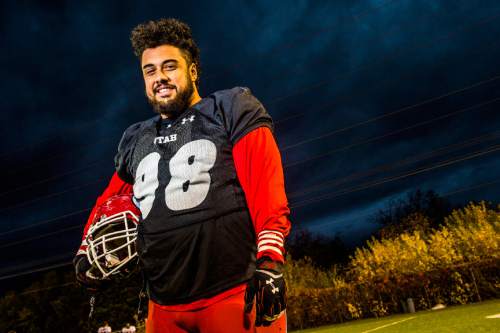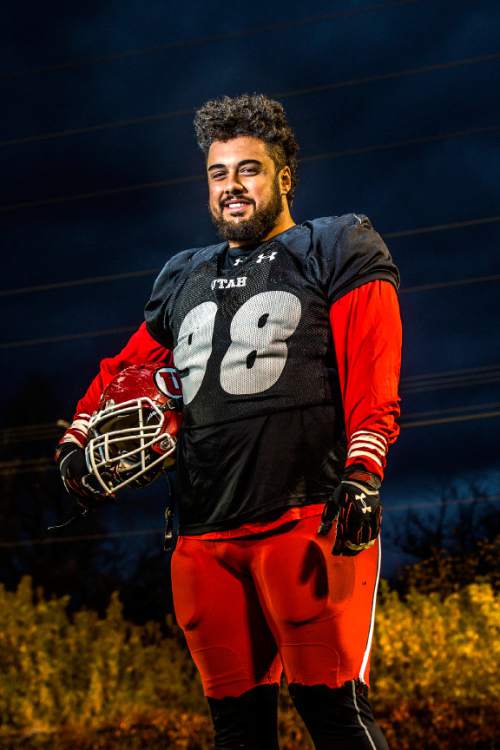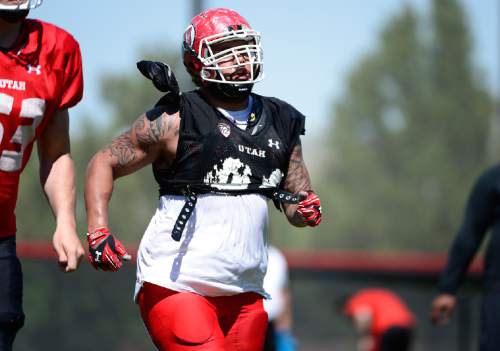This is an archived article that was published on sltrib.com in 2015, and information in the article may be outdated. It is provided only for personal research purposes and may not be reprinted.
When Gina Newton, a nurse by trade, taught her son CPR when he was in high school, she hoped he would never need it, but wanted him to be prepared if he did.
Last week, Newton read that her boy, Viliseni Fauonuku had saved a man's life using CPR. The Utah senior defensive tackle had rushed to help a stranger, restarted his heart, and did not tell her.
She texted him: "It's an incredible feeling to bring someone back." Then she told him she loved him.
It took minutes for Fauonuku to bring back a man from near death. It has taken years for him to recover his good name from the brink.
Fauonuku, who goes by the nickname "Seni," has been praised in the past week for his livesaving efforts, only a few years after he was a poster boy for crime in sports. The 22-year-old, the youngest child of seven, is seen as a mentor and fiercely loyal friend to his teammates, a role model among the Utes.
But the upward arc of Fauonuku's career had one stiff drop, a mistake that almost cost him football and possibly more. However, by the grace of his supporters and loved ones — and the criminal justice system — he got another chance.
And with it, he's moved past the infamy that once defined his career.
Feisty player, total teammate
Summoning Seni Fauonuku is as easy as picking a fight with any of Utah's defensive players. Like a snarling bull, he'll be the first to leap into a practice fracas.
"He's a feisty dog now: He'll get in the pits and fight you," defensive coordinator John Pease said. His teammates "really admire that in him. That kind of leadership, you need to have on your team."
His attitude makes up for perceived physical shortcomings: At 5-foot-11, the bearded Fauonuku is the shortest scholarship defensive tackle on the team, and his speed and quickness are considered pedestrian.
And yet, he's starting alongside Lowell Lotulelei, and has seen an increase in his snaps. He can muck up running lanes and create pressure even with his smaller frame. His height often translates well, as blockers can't get lower than him, and he is tenacious when it comes to his assignment.
"He's been a technician," said Dave Peck, Fauonuku's coach at Bingham. "You just don't move him out of there. Even when he gets double teamed, he makes a pile and doesn't give up that area."
When he's not training on the field, Fauonuku can often be found at Gym Jones, a Salt Lake facility where he studies martial arts. He excels at Kali, a Philippine discipline of stick and knife fighting that helps develop his hand movement and makes him awfully tough to block.
Hiva Lutui, who played briefly with Fauonuku at Euless Trinity High School in Texas, said Fauonuku's multiple skills are hard to account for: "He's just difficult."
Off the field, Fauonuku's persona is relaxed, and he often hunkers down for video games with teammates. He's one of the driving forces behind the Polynesian team members getting together for barbeques and bonding over kava. He once cooked lamb and tapioca in an umu, a Polynesian underground grill that Lutui still drools over.
Talking to the Utes and Fauonuku's fight training partners, a picture emerges of a man with overpowering will, but who can replace intensity with friendship as soon as the whistle blows. He knows when to fight, and he knows when to offer a friendly hand.
"He's come so far as a person," says Enele Tauteoli, a Gym Jones trainer. "He's always thinking of others — he's always the first one to reach out."
A dark past
Almost universally at Utah, Fauonuku is seen as a consummate competitor and teammate, which makes his infamous infraction all the more difficult to understand.
Pease, who recruited Fauonuku in 2010, recalled his indiscretion as a "goofy thing." Time has seemingly watered down the memory of how serious his arrest and the initial armed robbery charges were when he was a 17-year-old senior at Bingham.
First reported by The Tribune, but memorably chronicled at the lead of a Sports Illustrated investigation piece, Fauonuku was accused of brandishing a gun — later clarified as a pellet gun — and pointing it at several people in a garage while his cousin took money and marijuana off their hands. As he left the scene, he allegedly told them: "If I hear this on the news, I'm going to come back and kill you."
When Fauonuku was eventually arrested, the charging documents of the case portrayed a cold-blooded, callous crook.
"I was in disbelief because that's not the Seni I know," said Lutui, who found himself flummoxed after reading the Sports Illustrated account. "He wasn't what they portrayed him to be."
This much is undisputed: Fauonuku admitted to felony robbery in juvenile court, but the incident was classified as a "delinquent act," which eventually allowed him to sign a letter of intent at Utah. He served 125 hours of community service and six months of probation. His 20-year-old cousin was sentenced to four months in jail.
At Bingham, counselors and the parents of teammates helped make sure he was focused on his studies. Coaches from both on the Miners and Utes stood by him.
"There wasn't a single person at Bingham that didn't want to back him," Peck said. "Yeah, because he was in the high-profile program, it brought him negative press. But I don't think he would be where he is today if he wasn't at Bingham."
Pease said the Utes chewed on Fauonuku's future, but were ultimately swayed to honor his scholarship offer when they saw his sincerity, his newfound desire to play and excel in class, and his remorse. Pease reasoned that Seni had made a brief hiccup — not a life-changing mistake.
The difference, in Seni's case, might be that he got to chance to prove he could turn himself around. He understands he's lucky: In his sociology class, he reads about textbook situations like his all the time, and he knows things could have turned out differently. He aims to pay his blessings forward.
When Dominique Hatfield was arrested in July, teammates recall Fauonuku was one of the first to send out a mass text, asking the Utes to pitch in to help the junior cornerback face his legal troubles.
"It's more personal for me," he said. "I've been in that situation, and I understand what it's like."
Life in his hands
The week before the USC game, Fauonuku and Lotulelei were playing video games in an apartment where several Utah offensive linemen live. They heard commotion coming from the hallway, then a knock at the door.
Lotulelei opened to a frantic neighbor, who said something about "chest compressions."
The linemen went to the next door apartment to find a man sprawled out on the floor. His lips were blue, his eyes rolled back and he was motionless.
It wasn't the first time Fauonuku performed CPR: He had tried to save his 18-month-old nephew's life in 2009 after a household accident, but the boy had died — an incident many close to him cite as the beginning his troubles in high school.
He had seen death before. He thought he was seeing it again now, as he pumped at a silent heart.
"Honestly, I thought he was dead," Fauonuku said. "His tongue was out. His stomach was really hard, and I thought, 'Man, this guy is dead.' But I kept going anyway."
Two minutes into his CPR, the man coughed and his vital signs rebounded slightly. Paramedics arrived just as Seni brought him back.
A group of linemen, including Lutui, returned to the apartment soon after, and recalled Fauonuku telling the story of saving a man's life with the same breeze as if he was talking about a drill in that day's practice.
"Seni, he doesn't have a big head," Lutui said. "He's just thankful that he could help out someone."
But why stop with saving just one life?
While many seniors' goals are tied to the NFL, Fauonuku has shifted ahead to when football is over: He's looking forward to moving down to Ephraim, helping his mom take care of her farm which includes horses, goats and peacocks. He wants to open a rehabilitation center for troubled youth with his brother, Richard Newton.
Seni dreams of bringing in kids to Ephraim — especially teenagers from the underserved Native American and Polynesian communities — and helping them understand the impact of their decisions. The brothers have been planning out their vision for the past four years: Richard will be the lead counselor, and Seni will be his lieutenant.
One thing Fauonuku has come to understand through the mistakes of his youth and the steadiness of his years with the Utes: There's great power in his hands. He can use it to threaten lives, or he can use it to save them.
"I'm a believer that we're here to serve other people," he said. "With those people who helped in my life, if I can be that person who changes someone else's life, I want to do that."
Twitter: @kylegoon —
About Viliseni Fauonuku
• Has 17 tackles this year in six starts, including 2.5 TFL
• Has 5 sacks and 68 total tackles in his Utah career
• Was an all-state player at Bingham High, where he had 173 tackles and 16 sacks
No. 13 Utah at Washington
P Saturday, 5:30 p.m.
TV • FOX







